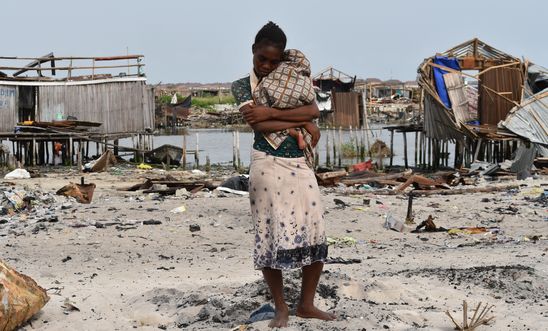
Press releases
Nigeria: 'Ruthless' forced evictions leave 11 dead and 30,000 homeless - new report

The Nigerian authorities must halt a violent campaign of forced evictions in waterfront communities in Lagos State, which has left more than 30,000 people homeless and 11 dead, Amnesty International said today (14 November).
Amnesty’s report, The Human Cost of a Megacity: Forced Evictions of the Urban Poor in Lagos, reveals repeated forced evictions of the Otodo-Gbame and Ilubirin communities since March 2016, with people drowning as they fled gunfire and burning homes.
Celestine Ahinsu, from the evicted Otodo-Gbame community, told Amnesty:
“After a couple of days, we started seeing the bodies floating. I saw three - a man with a backpack and a pregnant woman with a baby on her back. The community youths brought the bodies from the water. The relatives of the pregnant woman and child came to take their bodies.”
Amnesty spoke to 97 evicted people, who lost almost everything, as part of their research. The raids were carried out without consultation, adequate notice, compensation, or offers of alternative housing.
Osai Ojigho, Amnesty International Nigeria’s Country Director, said:
“For the residents of these deprived communities, many of whom rely on their daily fish catch to make a living, the waterfront represents home, work and survival. Forced evictions mean they lose everything - their livelihoods, their possessions and in some cases their lives.
“These ruthless forced evictions are just the most recent examples of a practice that has been going on in Nigeria for over a decade, in complete defiance of international law.
“The Lagos State authorities must halt these attacks on poor communities who are being punished for the state’s urban planning failures. The instability and uncertainty created by forced evictions is making their lives a misery as they are left completely destitute.”
Communities under attack
Between November 2016 and April this year, Lagos State authorities forced more than 30,000 people from their homes, in the Otodo-Gbame community on the outskirts of Lagos city.
In the first eviction, at midnight on 9 November last year, police and unidentified armed men targeted residents with gunfire and teargas, setting homes on fire, before bulldozers demolished them. Panicked residents tried to run from the chaos, but eyewitnesses reported that nine people drowned in the nearby lagoon as they fled gunfire.
Of the 4,700 residents who remained in Otodo-Gbame after the eviction, some slept in canoes, or out in the open, with only plastic sheets for cover. In March this year, state security forces, backed by unidentified men armed with machetes, guns and axes, forcibly evicted the remaining residents. Those who protested were attacked by police.
The forced evictions were carried out in direct violation of court orders issued on 7 November last year and 26 January this year. Some residents were evicted when they showed police a copy of the court order that was supposed to protect them.
Meanwhile, in nearby Ilubirin community, 823 residents were forcibly evicted between 19 March last year and 22 April this year. They were given just 12 days’ written notice. Lagos State government officials, and dozens of police officers chased residents out of their homes, before demolishing homes using fire and wood cutting tools. Evictees returned to rebuild their homes, but these were demolished six months later with just two days’ oral notice and no consultation. A total of 17 people, including two children, remain missing following evictions in both communities.
Lack of safeguards and a need for investigation
All forced evictions in the Ilubirin and Otodo-Gbame communities occurred without consultation, adequate prior notice, provision of compensation or alternative housing - contrary to Nigeria’s international legal obligations.
Osai Ojigho said:
“The Lagos government must set up a panel of inquiry to investigate the forced evictions and attacks at Ilubirin and Otodo-Gbame. All those responsible for criminal acts - including officers of the state - must be brought to justice through fair trials.
“There must be a moratorium on mass evictions until the Lagos State government has regulations in place that ensure evictions comply with international standards. Finally, the authorities must urgently launch an investigation into the whereabouts of all those reported missing following the Ilubirin and Otodo-Gbame forced evictions.”
Government inconsistencies
The Lagos government’s explanations for these forced evictions have been highly inconsistent. In November 2016, it denied any responsibility and blamed the evictions on a communal clash that resulted in fires which razed communities. In March this year, the government said it was acting to protect environmental health.
On 9 October 2016, the Lagos Governor stated the demolitions were intended to stem a rise in kidnappings, alleging that irregular structures serve as criminal hideouts. And in April this year, the State Ministry of Justice said the government forcibly evicted thousands of Otodo-Gbame residents because it believed militants were hiding amongst them.
Background
Amnesty’s findings are based on 18 field investigations, carried out over a 19-month period, including interviews with 124 people and analysis of photos, videos and documents, including hospital records and court rulings.
Eight meetings were held with government officials, while 17 officials from the Lagos State government and the Nigerian Police were interviewed. Forensic experts analysed photos of corpses of evictees, bullet casings and teargas canisters found in the Otodo-Gbame community.
Amnesty has shared its findings with the Lagos State authorities, but has received no response.
Between 2000 and 2009, the Nigerian authorities forcibly evicted over two million people. In February 2013, the authorities in Lagos State forcibly evicted at least 9,000 people from Badia East to make way for a government building project. In September 2015, about 10,000 people were evicted from Badia West and the surviving parts of Badia East.
Nigeria is a party to the International Covenant on Economic, Social and Cultural Rights and other international and regional human rights treaties, which ban it from carrying out forced evictions.